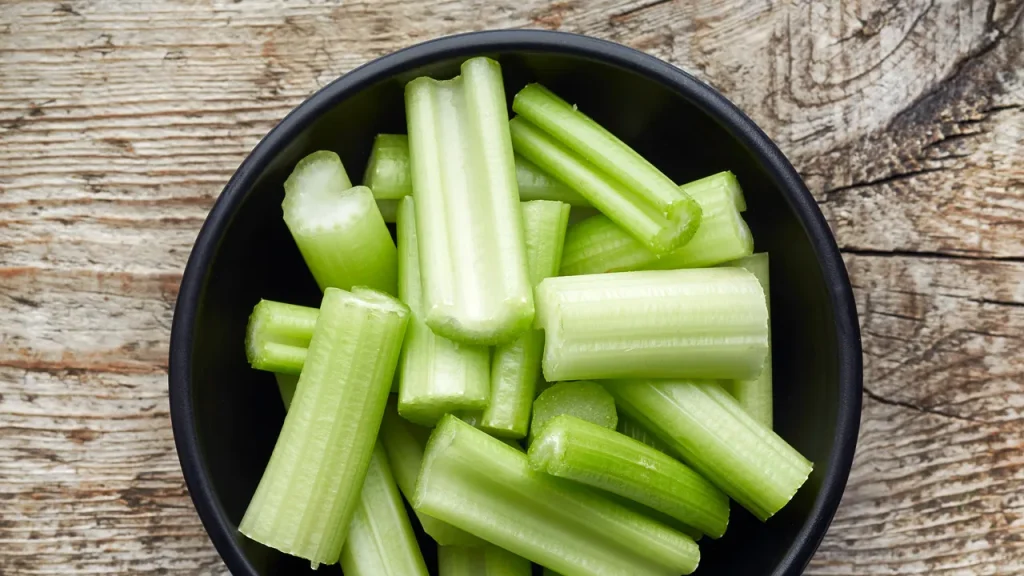Celery, scientifically known as Apium graveolens, belongs to the Apiaceae plant family and offers a wide range of health benefits. It is rich in antioxidants, essential enzymes, and a variety of vitamins and minerals, including vitamin K, vitamin C, potassium, folate, and vitamin B6. For centuries, celery has been used in folk medicine, particularly as an anti-hypertensive agent. Modern pharmacological research continues to support its cardiovascular benefits, showing that celery helps improve blood pressure, lower cholesterol levels, and prevent heart disease due to its antioxidant and anti-inflammatory properties.
In addition to its cardiovascular advantages, celery is also high in dietary fiber, especially when consumed in larger quantities, which supports digestion and aids in weight management. Celery’s high water content and electrolytes help prevent dehydration, and certain compounds act as diuretics, reducing bloating. The antioxidant flavonoids and polyphenols found in celery also contribute to its positive effects on liver, skin, eye, and cognitive health.
While most people consume celery stalks, the leaves and seeds are also edible and beneficial. Celery leaves are a great addition to stir-fries and soups, while celery seeds—available in whole, extract, or ground form—boast significant health benefits. These seeds have anti-inflammatory properties and help combat bacterial infections. In some regions, celery is primarily grown for its seeds, which are technically small fruits. When crushed, celery seeds are used as a spice and contain an oily compound called apiol, which is both a flavoring agent and a medicinal component.

One cup of chopped celery contains:
- 16 calories
- 0 grams of fat
- 1 gram of protein
- 5 grams of fiber
- 5 milligrams of vitamin K (37% of the recommended daily intake)
- 36 milligrams of folate (9% of the recommended daily intake)
- 22 milligrams of vitamin A (9% of the recommended daily intake)
- 263 milligrams of potassium (8% of the recommended daily intake)
- 1 milligram of vitamin C (5% of the recommended daily intake)
- 40 milligrams of calcium (4% of the recommended daily intake)
- 0.08 milligrams of vitamin B6 (4% of the recommended daily intake)
Here are 10 reasons to include celery in your diet:
Rich in Nutrients: Celery is packed with essential vitamins and minerals, including vitamin K, vitamin C, potassium, folate, and vitamin B6, which are vital for overall health.
Supports Cardiovascular Health: Celery contains compounds that help lower blood pressure and cholesterol levels, potentially reducing the risk of heart disease.
Boosts Digestion: With its high fiber content, celery promotes healthy digestion, preventing constipation and supporting a healthy gut.
Helps in Weight Management: Low in calories and high in fiber, celery can help control hunger and promote weight loss, making it a great snack for those looking to manage their weight.
Hydrating Properties: Celery is made up of about 95% water, which helps keep you hydrated and supports overall body functions.
Natural Diuretic: Celery has natural diuretic properties that help flush excess fluid from the body, reducing bloating and supporting kidney health.

Rich in Antioxidants: Celery is full of antioxidants like flavonoids and polyphenols, which protect the body from oxidative stress and support long-term health.
Anti-inflammatory Benefits: Celery has natural anti-inflammatory properties that can help reduce inflammation, potentially alleviating conditions like arthritis and joint pain.
Supports Liver and Skin Health: The compounds in celery promote detoxification, supporting liver health, and improving the appearance of your skin by reducing inflammation and free radical damage.
Improves Cognitive Function: Celery contains nutrients that support brain health, potentially improving focus, memory, and cognitive function as you age.

















